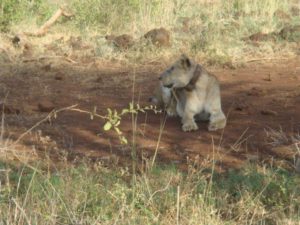Born Free

‘Keep wildlife in the wild’
Like so many, as a child I loved animals. After watching International Velvet I skipped around, pretending that, just like Tatum O Neil, I was riding a champion horse. My beautiful, patient German Shepherd dog, Heidi, indulged my fantasy and tolerated me riding her around our garden in Wimbledon. I frequently ‘rescued’ dead birds that had fallen out of their nests, and tried to nurse them back to health in shoe boxes lined with cotton wool. Of course I resurrected none, but it didn’t stop me trying.
Born Free was the Kenya of my childhood. I watched and re-watched the film and wanted Joy Adamson’s life more than anything. It all seemed so exciting compared to the concrete world of my life in South West London. Even just the title sequence, with its giraffes and zebras running through the bush, drew me to an an exotic, fascinating place that I knew I had to see. Acacias. Savannah.
Through play I transported myself to Kenya. I camped under trees and crawled around on all fours, pretending to be a lion. I didn’t imagine that a few decades later, I would be living in Kenya.
On the night before our first trip to Meru, I watched Born Free again for the first time in many years. Have you seen it?
As an adult I saw the film a bit differently. I noticed the expats with their privileged existence; the large house, their servants, the 4 x 4 s. It made me wonder about colonial times. How did these people come to be in Kenya? How did they have access to such a life? But I also thought about how hard it is to adapt to life in other countries. Was it any easier then?
The film Born Free (1966) was set in a national park in Kenya. English game warden George Adamson (played by Bill Travers) and his wife, Joy (Virginia McKenna), cared for three orphaned lion cubs.
We travelled to Meru national park during our Spring break and retraced the steps of the Adamsons and their famous lions. It was our first safari in Kenya. We flew in a Cessna, for me the most exciting way to fly. The urban sprawl of Nairobi quickly disappeared and soon the vast, rural wilderness came into sight.
Meru National Park is wild and beautiful. The park straddles the equator and it has stunning scenery from woodlands on the slopes of Nyambeni Mountain Range. It is not visited by most tourists, who typically make a beeline for Amboseli or the Masai Mara.
We stayed at Elsa’s Kopje, a luxury camp named after the smallest of the three lions, Elsa, who stayed with the couple. It was amazing to actually be there in Meru. Complete wilderness. We watched the sunset sitting at ‘Elsa’s rock’.
On a game drive, we saw hippos happily wading in a nearby river, we watched herds of elephants and found a lazy lioness. I recalled bits of the film, imagining the Adamsons with their lions. Remnants of George Adamson’s broken down Land Rover were pointed out to us. Both Joy Adamson, and Elsa the lioness, are buried in Meru National Park.
In the film, Elsa gets blamed for causing an elephant stampede in the nearby village. The head warden of the park, demands the young lion either be trained to survive in the wilds of the Serengeti or be sent to a zoo.
I think the film was my earliest lesson in the importance of protecting animals. For years afterwards I wanted to be a vet. That never happened. But in many ways and on many occasions, I’ve taken the opportunity to get involved in animal conservation and campaigned against cruelty to animals.
The Born Free Foundation was established in 1984 by the two lead actors from the film, Bill Travers and Virginia McKenna. This month it has celebrated its 35th anniversary and continues to work for the conservation of animals in the wild, worldwide. “We work tirelessly to ensure that all wild animals, whether living in captivity or in the wild, are treated with compassion and respect and are able to live their lives according to their needs. As a leading wildlife charity, we oppose the exploitation of wild animals in captivity and campaign to keep them where they belong, in the wild” – Born Free Foundation
©Maggie M / Mother City Time
Find out more
https://www.bornfree.org.uk
http://elsaskopje.com
https://chelipeacock.com/destinations/kenya/meru
The Elephant Freedom Project is run by a small family, and is host to Kumari, a big sweet baby who loves melon and sugar cane, outsmarts her human visitors, and lives for her afternoon baths in the river. Unlike the so-called Elephant “Orphanages”, she is not chained, and is not used for riding or working. It is evident to anyone in her presence that this majestic creature is happy and healthy. She’s funny and cheeky, and when visiting one can bathe her, feed her, take her for a walk, and….clean the dung from her bed! (Someone’s gotta do it!)🤣 An interesting and educational visit to the dung factory is included, where you will learn about the natural making of paper products and buy beautiful stationery in the gift shop. You can visit for a full or half day, and even spend the night if you like. If you want a positive, heartwarming experience interacting with an elephant the way it should be, visit Kumari at the Elephant Freedom Project. She is waiting for you! 🐘😊
The elephant freedom project sounds amazing. Ethical travellers definitely want to avoid anywhere that chains its animals, and want to know about conservation efforts like this one. It sounds like here the elephant was free and happy and treated well. Thank you for sharing your experience Marla. Keep enjoying Mother City Time.